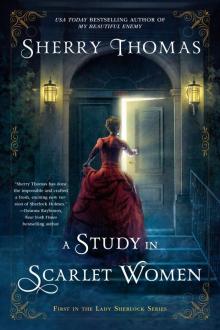- Home
- Sherry Thomas
The One in My Heart Page 3
The One in My Heart Read online
Page 3
Tears came back into my eyes. I sped up and finished sorting everything. “All done. I’ll go put them up.”
“Darling,” she murmured as I reached the hallway.
I poked my head back into the living room. “Yes?”
She sat with her profile to me, the lines at the corners of her eyes deeply etched. “‘I wish it need not have happened in my time.’”
What Frodo had said when he found out that the One Ring had come to him.
I first heard Zelda speak those words not long after my classmate’s brother committed suicide. I’d gone to my room, closed the door, and sat on the floor for a long time, shaking. Then I flipped through The Fellowship of the Ring until I found the line, lugged the book downstairs, and read Gandalf’s response to her.
After that, it became something of a ritual between us.
I put aside the clothes I was carrying, went back to her, and took her hands in mine. “‘So do I, and so do all who live to see such times. But that is not for them to decide. All we have to decide is what to do with the time that is given us.’”
I RETURNED MOST OF ZELDA’S clothes to her closet, and put the rest in her chest of drawers.
The top of the chest of drawers was thick with framed photographs. Zelda and I in the first picture we ever took together, at Central Park Zoo, my arms around a resigned-looking small white goat. Zelda holding aloft her Grammy for songwriting, surrounded by her musician friends. Zelda and I at the New Zealand premiere of The Return of the King, both of us laughing uproariously. Zelda with her cousins, hiking the southwest coast of England. Zelda and Mrs. Asquith, her godmother, the two of them holding up floral teacups with wildly exaggerated expressions of primness and decorum.
I loved looking through this pictorial record of Zelda’s existence, of her living a full life despite all the obstacles that had been thrown her way. But today my attention was immediately drawn to a photo at the very back, the biggest and most elaborately framed of them all.
The one I’d told Bennett about: of me in a ball gown and a diamond tiara.
My father, Hoyt Canterbury, was born to old money, but that money ran out before he could do anything about it. My mother was the product of a quiet, unexceptional suburb, but she had a moment in the late disco era when she became an “it” girl, a fixture on the Manhattan social circuit, her style copied, her pictures splashed across glossy magazines.
The one who had the most family connections, however, was Zelda, whose bloodline was mingled with those of half a dozen aristocratic families. But the way she explained it, she’d never been more than a poor relation—not that some of the earls and viscounts she was related to weren’t just as impoverished.
Pater—from paterfamilias, Latin for “father of the family,” because he refused to be called anything as pedestrian as “Dad”—had been a highly respected art dealer, but had always looked down on himself for having a profession, for being what he considered a glorified shopkeeper. What he had truly wanted was the life of a proper gentleman of leisure, to serve on the board of directors of major museums and civic organizations, and rule fashionable society with a velvet-gloved iron fist.
Since that hadn’t been in the cards for him, he’d turned his hopes of social prominence to a succession of women. But my mother left him early on, and Zelda was far happier working in her studio than entertaining. I had been his last, best chance. The fringes of high society were where some of the most influential hostesses launched from. And if I should turn out to be a girl with my mother’s “it” factor and his polish and ambition…
But from the moment Zelda brought home a block of dry ice for our Halloween party when I was seven years old, it had been the sciences for me, rather than the social register. Pater watched with constipated incredulity as my projects won science fair after science fair, regional, state, national.
He wasn’t reactionary enough to forbid me a life in goggles and lab coats, but he did draw a line in the sand: I had to have a proper debut when I was eighteen. And he set his sights high—the international Bal des Debutantes held at the Hotel Crillon in Paris.
He considered himself an American aristocrat; I harbored no such delusions. Yet to my shock, I was chosen. He, Zelda, and I flew to Paris. And since fashion was the reason the ball came into being in the first place, we went for a fitting as soon as we landed.
I was given a fashion-forward, slightly goth gown with a black net bodice over a sprawling black silk skirt. Pater whipped out a tiara that had been couriered from England, a loan from Mrs. Asquith, and placed it on my head. The designer’s assistant clicked his camera and an unlikely fashion photograph was born, one that had since taken on a life of its own.
The young girl in the image, caught in profile, bore only a tenuous resemblance to me. An ethereal, almost otherworldly creature, she gazed to her right, beyond the edge of the frame. Her raised hand extended in the same direction, as if to beckon a young man toward her.
Except romance had been the last thing on my mind. Instead I’d been reaching toward Zelda, who had been displaying signs of hypomania. I’d been desperately hoping it wasn’t the case, and Zelda had kept reassuring me it was only the excitement of being in Paris again.
But two days later, at the rehearsal, when the young man who had been designated my official escort for the ball failed to show up, Pater and I had to physically restrain her from jumping into the first taxi and rushing to the airport. Zelda, in the grip of mania, was one hundred percent confident that she would be able to drag the boy to my side in time for the ball, never mind that she didn’t know where he had gone to, or even what he looked like.
In the following days we had to restrain her from many other not-entirely-sane impulses. And when she came down from that awful high, she fell into a most brutal depression.
Six months later, she asked Pater for a divorce.
In the long aftermath of those unhappy days, it became my fantasy, my escape, to imagine how things might have been different had my escort arrived exactly on time.
The truth of the matter was that had he been there, nothing would have been any different. Nothing. But that was what fantasies were for, wasn’t it, to be as thoroughly divorced from reality as necessary? And so a faceless, nameless, and entirely ordinary boy became a magical Prince Charming, one whose mere presence was enough to save us from all future anguish and heartbreak.
I loved my Prince Charming, but only as a literary device, so I could tell myself the one story that lulled me to sleep on the longest, darkest nights. In fact, had I not run into Bennett, it was what I would have done when I eventually returned to Collette’s house: rewind time back to that moment almost fourteen years ago and weave an alternate history where Zelda, Pater, and I were still together, a somewhat dysfunctional family, but a family nevertheless.
Next to my “princess” photo was one of the three of us together at my first national science fair, when I was fifteen. I had won the grand prize and Zelda and I had been captured in a tight embrace, Zelda’s expression rapturous with pride. Pater stood a little to the side, looking bemused and resigned, whether at my victory or our closeness I would never know. Perhaps both.
I removed my hand from the frame of the picture, picked up the laundry basket, and carried on with my chores.
BY SUNDAY NIGHT BENNETT STILL hadn’t called or texted.
I was in bed, the lights turned off—and unable to sleep. I missed how I’d felt when I’d been with him—safe and at ease, always on the verge of smiling.
If only…
Zelda suffered from a mental illness, but I was the one who was messed up: My preferred method for dealing with everything that frightened, saddened, or unsettled me was to never speak of or even acknowledge it.
In other words, I was incapable of emotional intimacy. Even with Zelda, as close as we were, I’d never brought myself to admit my fear. The opposite, in fact. In front of her I kept my despair locked down the tightest.
I would have ma
de an awful girlfriend for Bennett.
But he’d given no indication that he wanted a relationship. Sex, that was what he wanted. We could hook up for delicious sex and nothing else.
I picked up my phone from the nightstand, considered it, and set it down again. I liked him too much. If we saw each other only when he felt horny, I would be crushed.
And I didn’t need any more uncertainties in my life.
It was the correct decision, but not a happy one. The restlessness in my heart…I almost wished I had pouring rain and miles of deserted country lanes.
So I made up a new fantasy.
Bennett hadn’t contacted me because he’d been called away all of a sudden by…Doctors Without Borders would be good here. That would easily put him on the opposite side of the globe from me. And when he arrived at his remote destination, while trying to get a new phone that worked locally, something would happen to his SIM card. So he couldn’t call me, because he’d lost my number.
But we weren’t destined to be parted forever. Instead, we’d run into each other at a most unexpected time and place. Perfect, I had a symposium in Munich next February. And he, on his way back from say, Tajikistan, would be staying at the exact same hotel.
I could already tell this was going to be a really, really good fantasy.
Chapter 3
ZELDA’S DEPRESSIVE EPISODE, MUCH TO my relief and gratitude, turned out to be relatively short. Her doctors arrived at a good new combination of meds, and life began to reapproach normal.
In the meanwhile, students returned to the university. I did most of my teaching in the fall, so I could concentrate on research the rest of the year. And teaching that many sections took up a huge amount of time, even without faculty meetings, my work with grad students, and the hours I needed to put in on my own papers.
Before I knew it, midterms were already over. One Friday afternoon Zelda and I went to the botanical garden to see the foliage, walking arm in arm on paths strewn with sweet gum and scarlet oak leaves.
Zelda had resumed working a while ago—she had accepted a commission to score a feature film, an exciting new venture after a successful career in songwriting and commercial music. We talked about her work and mine, and she told me that her therapist thought it would be fine for her to go on the Turquoise Coast walking trip that her English cousins had organized.
An older couple with a combined age well north of one hundred and fifty walked past us, hands held, nodding as they went. I gazed at them wistfully. I didn’t envy my friends their fresh new love affairs, but a faithful yet mellow companionship that came of a lifetime spent together? That never failed to make my heart pinch with longing.
“Oh, I almost forgot,” said Zelda. “I got an e-mail from the Somerset boy this morning.”
“What Somerset boy?”
“You know, the one who ditched us in Paris.”
I blinked. Was she talking about my Prince Charming?
One reason my alternate history had worked so well over the years was that the boy, who must now be a man in his early thirties, had simply disappeared. I never knew much about him to begin with, and I’d since remained happily ignorant.
Anonymity was key to Prince Charming’s success as a fantasy figure. It really wouldn’t be the same if the actual person was a divorced derivatives trader with a pending SEC investigation hanging over his head.
“How did he get hold of your e-mail address?”
“Oh, he’s on marvelous terms with Mrs. Asquith—used to spend a lot of time at her place when he was in England.”
I vaguely remembered now that my escort had been in England at the time, and was supposed to hop over to Paris for the weekend of the ball.
“And how does he know Mrs. Asquith?”
I’d never met Zelda’s godmother, but I couldn’t imagine her hanging out with American teenagers.
“His mother is English, and her aunt is a very close school friend of Mrs. Asquith’s.”
“Hmm,” I said.
Granted, I hadn’t had to lean on Prince Charming much lately—it had been all about Bennett and me in Munich. But I was loath to give up my workhorse of a fantasy. What if “the Somerset boy” had contacted Zelda to recruit her for a Ponzi scheme? That would totally limit Prince Charming’s future utility.
“Anyway,” said Zelda, “he e-mailed to apologize for ditching us all those years ago, and it was a very sincere apology.”
That I did not expect. “Why? I mean why now, after all these years?”
“I rang up his mother the moment I read his e-mail, and I told her, ‘I think the boy is finally ready to come home.’”
I didn’t understand what she was talking about. “From where?”
“Don’t you remember? His family disowned him after the ball.”
The Somerset boy could have set himself on fire in the days after the ball and I, completely preoccupied with Zelda, wouldn’t have known. “Not literally?”
“Literally. Wrote him out of their will. Cut off contact. Everything.”
I gaped. “Because he was a no-show?”
Which had been a dick move, but hardly an offense of that stature.
“Oh, no, there were loads of things going on at the same time. He was absolutely impossible. And there were whispers of a most unsuitable older woman. Now, where was I? Oh, the e-mail. When I mentioned the e-mail, Frances said she hoped to God I was right. The boy came back in grand style, bought an apartment on Park Avenue and all that. In the beginning she was on pins and needles waiting for him to get in touch. But now she’s wondering whether he didn’t plant himself in the middle of Manhattan to rub his success in their faces.”
My head spun with this overload of information. But at least there was no indictment. So maybe all was not lost.
“Frances would probably have taken the initiative to get in touch with him, if it were just her. But the real rupture was between the boy and his father. And she took her husband’s side in the matter, so…”
Zelda sighed. “Families can be so complicated.”
LATE THAT NIGHT I LAY in bed, still unable to process the fact that “the Somerset boy” lived on Park Avenue, not even a mile away.
Too close for comfort.
But thinking about Park Avenue also made me remember Bennett’s “ambition” for becoming a Park Avenue trophy husband—and that never failed to bring a smile to my face.
Followed by a pang of melancholy.
The more I played back our encounter, the more improbable it seemed. How was it that I’d felt so comfortable with him, when he had seen me in a state of absolute vulnerability? One would think, given how adamant I was about keeping my pains and fears locked down and out of sight, that I’d want to get away from him as soon as possible.
And yet I’d done the exact opposite.
I snuggled more deeply under the covers and allowed myself to escape to Munich. The real-life me was scheduled to present a paper at the symposium. After my talk, the fantasy me would head out to Munich’s famed Englischer Garten, warmly bundled, for a nice, long walk to unwind.
It would start to snow; the garden would be silent and lovely. And then, when I returned to the hotel, who should get in the elevator with me but the man I couldn’t stop thinking about.
In some iterations of this fantasy, we could barely wait until we were in his room to rip off each other’s clothes. But tonight I went for the ultradeluxe version, in which we shared coffee, dinner, after-dinner drinks, and even a few minutes outdoors on the hotel’s observation deck, as that very romantic snow continued to fall, enveloping us in one of nature’s most perfect crystalline forms.
I haven’t stopped thinking about you since the night we met, said the fictional version of Bennett, pulling me toward him, a dusting of fresh snow on the shoulders of his coat.
I should believe that when I haven’t heard from you for six months? I’d retort.
Yes, you should, he’d reply, looking into my eyes, because it’s true.
And then he would kiss me at last.
EARLY IN DECEMBER, I TAUGHT my last class for the semester.
I ended the lecture fifteen minutes early, so the students could fill out evaluation forms, which my grad student would collect. But as I left the classroom, a student named Keeley followed me out.
“Dr. Canterbury, excuse me, can I ask you a question?”
“Sure.”
“Savitha and I have a bet. I say this is you.”
I knew exactly what I’d see even before she held out her phone toward me—she wasn’t the first student to have stumbled across my “princess” photo, which had turned into a bit of an Internet meme. The last time a student asked me this question, the dress had been Photoshopped to a tutu pink, with a caption that read, Someday my prince will come. This time the couture gown had been swapped out altogether in favor of an Elvish robe. My hand was held out toward none other than Aragorn. And between us were the words, Someday my king will return.
I laughed. “No,” I told Keeley, “it’s not me. But can you send me the image? My stepmom is a huge Tolkien fan and she’ll love this.”
Back at home, as soon as I’d sat down on the living room couch, Zelda poked in her head and said, “I had lunch with the Somerset boy today.”
“What? Just like that?”
“He rang. I asked him if he’d like to meet in person instead. He told me to name the time and the place.”
Zelda flitted into the kitchen and came back with cups of tea and a plate of cheese crisps for us. “And guess what we talked about at lunch?”
“His intentions toward his parents?”
“No, he was quite guarded about that. We talked about you, mostly.”
The idea of my gloriously anonymous Prince Charming not only acquiring a definite identity but holding a conversation about me…What the hell was going on?
“He knows all about you,” Zelda went on. “Well, everything that can be Googled, in any case: the genius grant, your patents—and even that conference in Germany you’re going to in February.”

_preview.jpg) Claiming the Duchess (Fitzhugh Trilogy Book 0.5)
Claiming the Duchess (Fitzhugh Trilogy Book 0.5) The Art of Theft
The Art of Theft The Magnolia Sword: A Ballad of Mulan
The Magnolia Sword: A Ballad of Mulan A Study In Scarlet Women
A Study In Scarlet Women The Hollow of Fear
The Hollow of Fear The Magnolia Sword
The Magnolia Sword Beguiling the Beauty ft-1
Beguiling the Beauty ft-1 The Heart is a Universe
The Heart is a Universe The Hidden Blade: A Prequel to My Beautiful Enemy (Heart of Blade)
The Hidden Blade: A Prequel to My Beautiful Enemy (Heart of Blade) Ravishing the Heiress ft-2
Ravishing the Heiress ft-2 The Immortal Heights
The Immortal Heights The Hidden Blade
The Hidden Blade Ravishing the Heiress
Ravishing the Heiress Tempting the Bride
Tempting the Bride The Luckiest Lady in London
The Luckiest Lady in London The Bride of Larkspear: A Fitzhugh Trilogy Erotic Novella
The Bride of Larkspear: A Fitzhugh Trilogy Erotic Novella Claiming the Duchess
Claiming the Duchess The One in My Heart
The One in My Heart His At Night
His At Night A Dance in Moonlight
A Dance in Moonlight A Conspiracy in Belgravia
A Conspiracy in Belgravia Not Quite a Husband
Not Quite a Husband